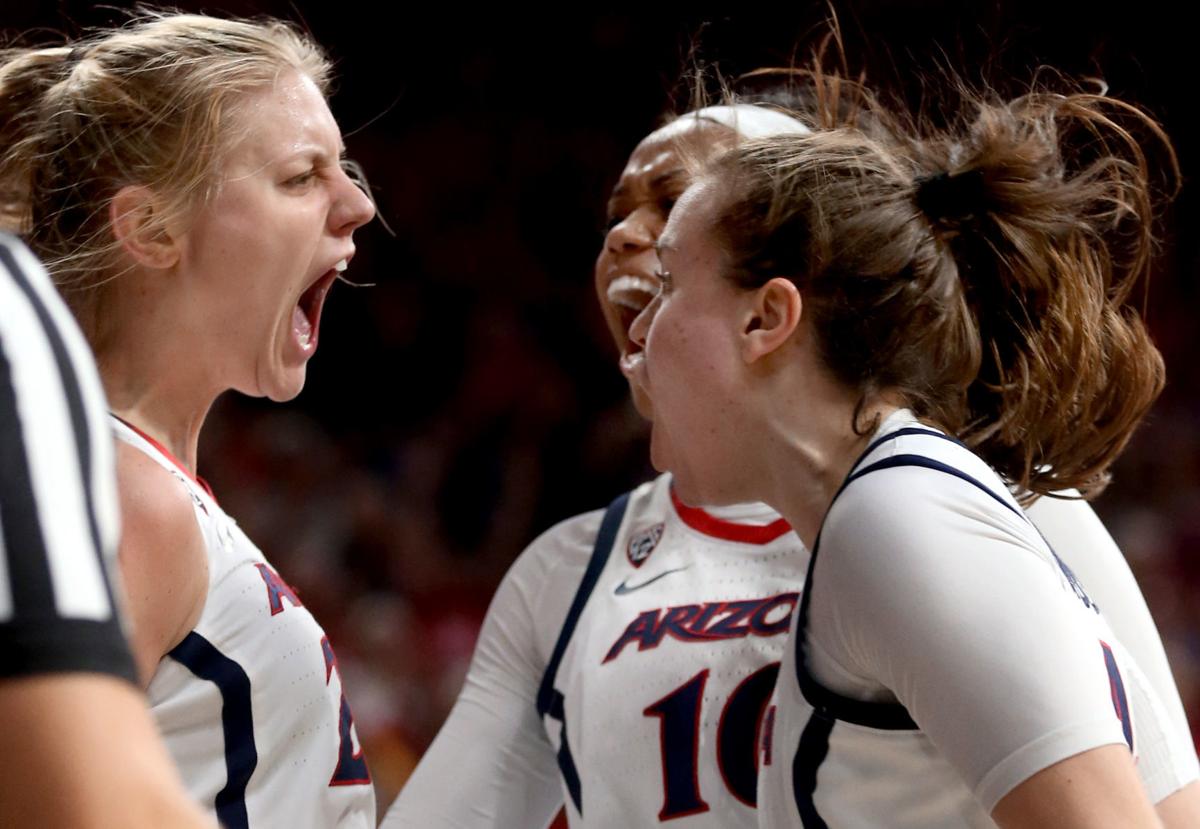Adia Barnes is so knee deep in the hoopla that she surely leads the NCAA in smiling.
You could almost write a song about it. Call it “Happy.”
True, Pharrell Williams already used the title “Happy” for a famous song, in which he sings, “My level is too high to bring me down ... Can’t nothing bring me down.”
But on Sunday, Arizona’s 67-45 WNIT victory over Wyoming qualified as “Happy II” or “Happiness” or even “I Can’t Stop Smiling.”
Barnes described the UA’s fourth consecutive WNIT victory by saying, “We were amped up, we were just hot … the adrenaline. … the crowd.”
Barnes’ level is too high to bring her down.
The greatest victory in Arizona women’s basketball history has long been considered a 1998 buzzer-beating, prayer-answering, 91-90 shocker over Stanford, which snapped the Cardinals’ 48-game Pac-12 winning streak and Arizona’s 22-game losing streak to the Cardinal.
Barnes, then a UA senior, scored 22 points in that game at McKale Center, after which she described her role in Reshea Bristol’s winning 3-pointer as that of a spectator.
“I was saying ‘please,’” Barnes said that night.
On Sunday, 21 years later, Barnes was anything but a spectator. She has engineered Arizona’s run to the WNIT’s version of the Final Four by rebuilding from scratch the Pac-12’s worst women’s basketball program of the last decade.
Arizona no longer has to say “please.” It has drawn 20,123 fans in four WNIT games, and when it squares off against TCU in Wednesday’s semifinals it’s not inconceivable that 10,000 Tucsonans will be at McKale Center.
“A lot of people say, ‘Oh, women’s basketball is not exciting,’” Arizona’s dynamic point guard Aari McDonald said Sunday.
But now, we should know better.
Arizona’s road to the WNIT Final Four hasn’t exactly been the stuff of legend. The Wildcats have beaten Idaho State, Pacific, Idaho and Wyoming by a cumulative 56 points, as you’d expect.
And they’ve also been granted home court advantage in all four games, thanks to athletic director Dave Heeke’s willingness to bid a higher amount of money to the organizing body of the WNIT, Colorado’s Triple Crown Sports, which decides who stays home and who hits the road.
But shed no tears for the Wyoming Cowgirls, or anyone. Until Sunday’s loss at McKale, Wyoming had played host to 22 consecutive WNIT games.
This has all been made possible by a Tucson audience that has met Triple Crown Sports’ second variable (behind money) in the selection of a host team — environment.
McKale Center has been buzzing.
“It felt like how a men’s basketball game feels here,” said Barnes.
It has been that and more. Those 20,123 who’ve bought tickets on short notice and walked through the McKale Center turnstiles have a different energy than those at UA men’s basketball games.
There’s a joy that’s missing at the men’s games. There’s an innocence and a sense of being at the start of something big.
This is unexpected; out of nowhere.
It’s the best story in Tucson sports.
The demographics of Tucson’s WNIT audience is nothing like those who have supported UA men’s basketball games for the last 35 years. It’s an older crowd, one that feels included rather than excluded, one that doesn’t spin on big money and grand expectations. There is no Zona Zoo.
It’s an audience that watches Aari McDonald play point guard as well or better than anyone in UA history, men or women, and you can’t wait to tell or text someone what they’re missing. Even UA President Robert C. Robbins, who occupies a front-row seat at men’s basketball games, flew home early from a business trip last week to be at Arizona’s win over Pacific.
On Sunday, Robbins was front-and-center for a commanding triumph over Wyoming, one in which Arizona jumped to an 11-0 lead, creating a din that matched any at a men’s basketball game in recent years.
His presence stamps the whole WNIT process as legit.
In the lead-up to Sunday’s game, Arizona’s game management staff multiplied its security, parking, ushering and medical personnel to meet the sudden demand. Parking was free, which helped. Tickets went for as low as $5, which helped more.
But more than that, winning four straight games fills an ache that long-disappointed UA sports fans have felt for what seems like ages.
“They ignite us,” said Barnes. “They inspire us.”
The Wildcats didn’t find an audience as much as an audience found them.





